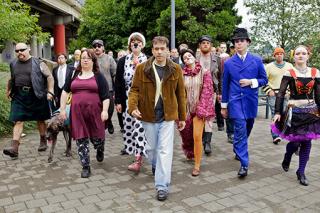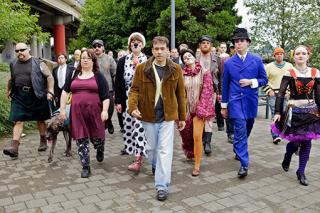
I had the occasion to attend Canada Days in Portland, Oregon, not long ago. It’s a week-long celebration of Canadian industry, arts and culture, but it also added up to being the strangest trip south of 49 I’ve ever had. Until I received the email invitation, I had no idea there was such a festival, despite the fact that it started in Anchorage and is now happening in various other American cities including Boise. In any case, it’s apparently the brain child of the Canadian consulate in Seattle – and as unlikely as such an event might seem, I was happy to be asked. Let’s be honest, it was a chance for me, a Canadian novelist, to talk about the literary life in my country. I had a book to promote. And besides, the email promised a room at the Westin. I think I probably accepted in less than five minutes.
I was picked up at the Portland airport by Rudy, a public affairs officer in the Seattle consulate. He’s an American citizen, and on the way into town, all he wanted to talk about were the mid-term elections. These had gone pretty heavily the Republican way, and Rudy was aghast. Many people he knew were aghast. I’d just taken a 6:30 AM flight from Vancouver and frankly, I wasn’t fully awake, much less offended by American electoral developments. Sensing this, Rudy changed the topic. Be it resolved that Portland is a pretty city although, admittedly, Canadians has pretty high standards in this regard. No sparky debate ensued.
As it turned out, the Westin was too expensive, so we were put up at the Mark Spencer instead, which a Portland resident would later estimate to be the city’s cheapest hostelry that does not rent rooms by the hour. This didn’t bother me. Having a health care system to protect, I’m on side with cost-cutting measures. Besides, I told myself while walking up the six flights to my room (the elevator was broken) Rudy had me booked solid with readings. I’d hardly be in the hotel. Indeed, my first engagement was an hour later, at Portland Community College. Kevin, another cultural affairs operative at the consulate, and also American, called to suggest we meet at the Westin.
“But we’re not staying at the Westin — ” I started, then the nickel dropped. That’s where consulate staff are staying. Of course.
Kevin warmed up the 30-odd students at PCC with a quiz. How many of you know the capital of Canada? How many of you know the name of the President of Canada? Sullen silence. And then: how many of you have seen one of these before?
He reached into his briefcase, but for what? A maple leaf? A can of Blue? No. What Kevin pulled out was a Coffee Crisp chocolate bar. “It’s from Toronto!” Kevin said, smiling indulgently and begging to distribute more of them to the class.
I’m not normally in favour of giving out candy before a reading. It smacks of bribery. Plus, I can’t stand crinkling paper when I’m trying to emote. But I needn’t have worried. So convincing was Kevin’s portrayal of the Coffee Crisp as alien object that most of the students were reluctant to taste them. A girl in the back row gingerly peeled away the wrapper and sniffed the contents, frowning. After a minuscule bite, she grimaced and shuddered. First taste of whale blubber, you might think.
Happily, the reading went over well. The students asked many intelligent questions and I left feeling upbeat. But in the car Kevin, the quarterback of Canadian cultural imperialism in Portland, revealed that he’d been given one thousand Coffee Crisps by Nestle and was committed to the task of distributing them. Since all of my scheduled readings combined were unlikely to accumulate an audience big enough to eat 1000 chocolate bars, he was staging a Coffee Crisp Give Away in Pioneer Courthouse Square the next day at noon.
We read that night at the Portland Public Library. It’s a beautiful building and my writer colleague and I enjoyed the literary ambience, the suggestion of a large crowd made by all the chairs (a Coffee Crisp set neatly on each one) though in fact, attendance just squeaked into two digits. And the Q&A afterwards got off to a predictably sleepy start when my reading partner announced that she was boycotting all future American readings in support of Rohinton Mistry.
At this point some background is necessary. There are two types of political Oregonians: “Dry-siders” (who live inland and are extremely conservative) and “Wet-siders” (Portland-based, typically liberal). Since Dry-siders are not well known for attending celebrations of Canadian culture, tonight’s crowd was a Wet-side crowd. And if you tell a Portland Wet-side crowd you’re boycotting them because of their own federal policies – after these particular mid-term election results, anyway – you will be met with FAR greater enthusiasm than if you try to give them free chocolate bars. The small audience was practically on its feet with excitement at the opportunity to talk trash about US immigration and homeland security policy with the undisputed champs of self-trash-talking, Real Canadians. Literary discussion was derailed.
“What do writers in Canada think we should do?” one woman asked, poignantly highlighting a deep leadership crisis in Oregon.
Another man, misty with regret just hours into my colleague’s first visit to his city, said, “All I know is that I’m sad you’re not coming back. We’re going to miss you.”
I was tempted to announce my own boycott just to even things up. But all the egregious policy screw-ups I could think of were Canadian. And clearly these folks would not respond well were I to boycott Canada. I considered announcing a boycott of American accounting firms, but the audience would have sensed there was no personal sacrifice in it. And personal sacrifice, surely, is what gives moral rigour to my colleague’s announcement.
The next day, I felt my zeal waning. I met Kevin at the Westin again and realised he still had a van-full of Coffee Crisps. I sensed the assignment was starting to weigh on him too. Maybe he’d just found out that Nestle was actually a Swiss company whose motto is: “The World’s Food Company”. In any case, yesterday’s chocolate bar give-away didn’t liquidate the inventory as expected due to a steady, torrential rain. And there are only so many Coffee Crisps the squeegee kids can eat.
We were scheduled to address another group of students, smaller but more political. I started to wonder if they thought this would make me feel at home, but I was hardly seated before the electoral lament began. Not even my benign presence – I was trying to silently communicate the forgiveness of all Canadians – nor even the Coffee Crisps, which I finally decided would be the focus of my own life-long boycott, could console them.
“We’re so depressed,” said an 18-year-old man, conscious no doubt that a life of statistically normal duration would grant him only 27 more opportunities to right these recent electoral wrongs.
We pressed on through our grief to questions about writing, losing ourselves briefly in discussion of character development and the creative process. No one even raised the issue of Canada as a feature of my writing until the instructor asked about the Canada Council. And I had to skirt this question, since I have not (as yet) enjoyed the benefits of that august and generous body.
On the drive back, Kevin showed an interest in the writerly side of things. He had recently, he said, read a freelance piece in the Wall Street Journal comparing hotel room service across America. “Just going from hotel to hotel, ordering room service,” he sighed as we pulled up in front of the Westin. “That’s pretty much the perfect job, isn’t it?”
The climax of my visit was an evening reading at the Borders bookstore in central Portland. Not a soul showed up. Nada y puis nada. I’m not blaming anyone. It was my book they were ignoring. What was notable, however, was the guy browsing shelves who stopped me on the way out. He may not have wanted to hear us read, but he at least wanted to apologize for his lack of interest.
“I think it’s a sign that an empire has grown too big when we forget our neighbours,” he said, making earnest eye contact. “You’d think after 2000 years, this country would be a little more sophisticated.”
I turned to leave. He put a hand on my arm. He wasn’t one of those Americans, he reassured me. He cared about Canada. He was a Vancouver Canucks fan. And a Chretien fan too. I stopped, fascinated by this quirky set of enthusiasms. He was especially impressed, he went on to say, when Chretien cautioned America about projecting her power in ways that might humiliate other nations. “That was insightful, that was wise,” he said. “And simply extraordinary coming from a man who used to be a professional wrestler.”
I thanked him, sincerely, for his comments. I had no chance to thank Rudy and Kevin, however. They didn’t show up for the reading either. Rid at last of their Coffee Crisps, I concluded, our cultural officers had vanished into the Oregonian night.

